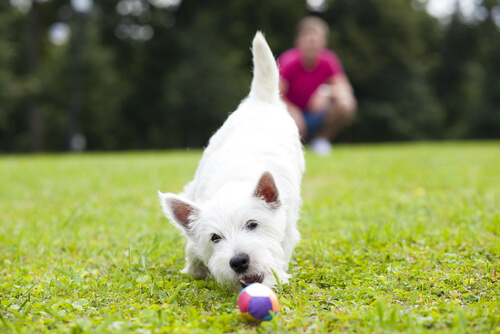5 Tops Tips for a Happy and Healthy Dog

It goes without saying that if you love animals, and you have a pet, then you’ll want nothing but the best for him. In this article, we’ll discuss some of the key things you need to keep in mind to make sure you have a happy and healthy dog.
Tips for a happy and healthy dog
If you decide to share your life with a dog, you’ll need to understand the responsibility you’re taking on. You also need to work out how you’re going to keep your dog happy and healthy, both physically and emotionally.
Remember, it’s not enough to simply meet their material needs. But neither is it a question of spoiling them.
There are many aspects to keep in mind if you want to keep your dog happy and healthy. Keep the following advice in mind, and this will be easy.
There are many things you need to do to keep your dog happy and healthy. Being a responsible owner means that you not only need to meet their physical needs, but also their emotional ones.
1. High-quality food and a specially tailored diet for a happy and healthy dog

More than simply choosing high-quality food for your pet (whether commercial or homemade), it might be a good idea to consult with a vet or – better still – an animal nutritionist.
An expert will be able to tell you the best options for your pet at every stage of its life, taking the following aspects into account:
- Breed
- Age
- Size
- Weight
- Level of physical activity
He’ll also be able to advise you as to how much food your dog needs on a daily basis, and how often you can give him treats. Remember, your dog must always have free access to plenty of fresh water, and should have a clean, well-ventilated place to sleep in.
2. Make sure they get the right amount of physical exercise
All dogs need daily walks and the opportunity to meet and play with other dogs. However, they don’t all need to do the same amount of exercise.
Some breeds were designed as working dogs, and have lots of energy to burn, while others are more laid back. But, just like humans, exercise is important for your dog’s heart, bone and muscle health.
A vet will also be able to tell you how much exercise your four-legged friend needs. However, there’s one thing you need to understand: taking your dog out for a walk doesn’t just mean going down to the end of the street so that it can do its business outside the house.
3. Take it for regular checkups at the vet
Yearly check-ups, vaccinations and regular worm and flea treatments are essential for your dog’s health.
Furthermore, you’ll need to keep a close eye out for any changes in its behavior or habits. Make sure you consult a vet if you have any concerns, so that they can provide any necessary treatment.
4. Train your dog
If you consider your dog to be a member of the family, then you need to teach it some basic rules so that it knows how to behave. To do this, it’s always best to use positive reinforcement.
Everyone in the household needs to understand and follow these rules too, so as not to confuse your pet with contradictory instructions.
Remember, while it might be one of the family, your pet isn’t a person. It’s a dog, so you should treat it as such. Dogs lick, bark, dig… and you need to accept this. Do this, and you should be able to avoid any health or behavioral issues, both physical and emotional.
5. Plenty of love and toys

Diet, training, exercise, and medical care are undoubtedly fundamental if you want a happy and healthy dog. However, no dog’s life is complete without a generous dose of love and attention.
It’s important to set aside time every day to have fun with your dog, take it for walks, and to play with it. Don’t forget to buy it toys, so that it can have fun on its own, especially when you don’t have time to.
It goes without saying that if you love animals, and you have a pet, then you’ll want nothing but the best for him. In this article, we’ll discuss some of the key things you need to keep in mind to make sure you have a happy and healthy dog.
Tips for a happy and healthy dog
If you decide to share your life with a dog, you’ll need to understand the responsibility you’re taking on. You also need to work out how you’re going to keep your dog happy and healthy, both physically and emotionally.
Remember, it’s not enough to simply meet their material needs. But neither is it a question of spoiling them.
There are many aspects to keep in mind if you want to keep your dog happy and healthy. Keep the following advice in mind, and this will be easy.
There are many things you need to do to keep your dog happy and healthy. Being a responsible owner means that you not only need to meet their physical needs, but also their emotional ones.
1. High-quality food and a specially tailored diet for a happy and healthy dog

More than simply choosing high-quality food for your pet (whether commercial or homemade), it might be a good idea to consult with a vet or – better still – an animal nutritionist.
An expert will be able to tell you the best options for your pet at every stage of its life, taking the following aspects into account:
- Breed
- Age
- Size
- Weight
- Level of physical activity
He’ll also be able to advise you as to how much food your dog needs on a daily basis, and how often you can give him treats. Remember, your dog must always have free access to plenty of fresh water, and should have a clean, well-ventilated place to sleep in.
2. Make sure they get the right amount of physical exercise
All dogs need daily walks and the opportunity to meet and play with other dogs. However, they don’t all need to do the same amount of exercise.
Some breeds were designed as working dogs, and have lots of energy to burn, while others are more laid back. But, just like humans, exercise is important for your dog’s heart, bone and muscle health.
A vet will also be able to tell you how much exercise your four-legged friend needs. However, there’s one thing you need to understand: taking your dog out for a walk doesn’t just mean going down to the end of the street so that it can do its business outside the house.
3. Take it for regular checkups at the vet
Yearly check-ups, vaccinations and regular worm and flea treatments are essential for your dog’s health.
Furthermore, you’ll need to keep a close eye out for any changes in its behavior or habits. Make sure you consult a vet if you have any concerns, so that they can provide any necessary treatment.
4. Train your dog
If you consider your dog to be a member of the family, then you need to teach it some basic rules so that it knows how to behave. To do this, it’s always best to use positive reinforcement.
Everyone in the household needs to understand and follow these rules too, so as not to confuse your pet with contradictory instructions.
Remember, while it might be one of the family, your pet isn’t a person. It’s a dog, so you should treat it as such. Dogs lick, bark, dig… and you need to accept this. Do this, and you should be able to avoid any health or behavioral issues, both physical and emotional.
5. Plenty of love and toys

Diet, training, exercise, and medical care are undoubtedly fundamental if you want a happy and healthy dog. However, no dog’s life is complete without a generous dose of love and attention.
It’s important to set aside time every day to have fun with your dog, take it for walks, and to play with it. Don’t forget to buy it toys, so that it can have fun on its own, especially when you don’t have time to.
This text is provided for informational purposes only and does not replace consultation with a professional. If in doubt, consult your specialist.








